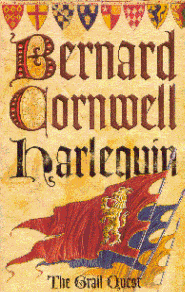Harlequin
by Bernard Cornwell
Published by Harper Collins.
ISBN 0-00-651384-0. Paperback. £6.99. 484 pages.
 The sub-title of this book is: The Grail Quest (the main reason for buying the book) but unfortunately The Grail does not feature hardly at all in this book. Then the penny dropped and the reviewer realised that this was the first book in a series.
The sub-title of this book is: The Grail Quest (the main reason for buying the book) but unfortunately The Grail does not feature hardly at all in this book. Then the penny dropped and the reviewer realised that this was the first book in a series.
Given the serialisation of television programmes (for instance soap operas) and the sub-division of major books into distinct parts for film making purposes (the Lord of the Rings trilogy is such an example) it is unsurprising that this has affected many other forms of artistic expression. These three books could easily have been published as a single volume without damaging the desire for a trilogy.
If Tolstoy lived today would he have written, and his publishers produced, War and Peace in four volumes carefully timed to catch the Spring, Summer, Autumn and Winter buying seasons? Sadly, I suspect that they would and great literature would have been diminished as a result.
So are we talking about great literature here? No, we are not. Cornwell produces historical (fiction) novels which are cleverly, and skilfully, based on historical fact. There is no criticism implied here especially as this author has given us such great reads as The Sharpe Series – novels which have very successfully been transferred to the small screen and starring the well known actor Sean Bean.
So what is the novel: Harlequin about? Well, it is centred on the battle of Crècy (1346) when the English laid claim to a large part of France. The resulting war as to who ‘owned’ that particular part of France is described through the eyes of an English longbow man – Thomas of Hookton. Thomas is of noble, although illegitimate, birth although he does not know it immediately. He is born and raised to the, Long Bow, a weapon feared by the adversaries of the English.
Thomas sets out in search of those who pillaged his village and killed his father. He begins a journey of adventure as a very young man and by the end of the novel (this, the first part at least) he has become a man who has seen and experienced much. He has loved and lost. He has fought and killed, been attacked and robbed, and hung nearly unto death but has made friends that stick by him through thick and thin.
The Scots get a one line mention as being enemies of the English and staunch supporters of the French.
The culmination of the novel is the battle of Crècy which is told graphically and with considerable accuracy. A victory for the English forces but the story of Thomas’ Grail Quest has only just began. We look forward to reading and reviewing the sequel particularly the author’s development of the subject of the Holy Grail.
As a ‘word picture’ of the events leading up to the battle of Crècy from an ‘ordinary’ soldier’s point of view this book is excellent and is recommended to all.
Those who have enjoyed the author’s Sharpe novels might like to know that there is a nice web site dedicated to the novels: The Sharpe Appreciation Society.